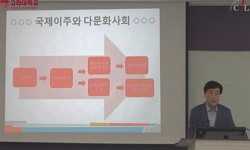In our contemporary society, a phenomenon of multiculturalism and globalization requests theoretical considerations of toleration in the new situational context. This article examines Habermas`s understanding of constitutional patriotism and the polit...
http://chineseinput.net/에서 pinyin(병음)방식으로 중국어를 변환할 수 있습니다.
변환된 중국어를 복사하여 사용하시면 됩니다.
- 中文 을 입력하시려면 zhongwen을 입력하시고 space를누르시면됩니다.
- 北京 을 입력하시려면 beijing을 입력하시고 space를 누르시면 됩니다.
https://www.riss.kr/link?id=A99933353
- 저자
- 발행기관
- 학술지명
- 권호사항
-
발행연도
2013
-
작성언어
-
- 주제어
-
KDC
300
-
등재정보
KCI등재
-
자료형태
학술저널
-
수록면
279-306(28쪽)
- 제공처
- 소장기관
-
0
상세조회 -
0
다운로드
부가정보
다국어 초록 (Multilingual Abstract)
In our contemporary society, a phenomenon of multiculturalism and globalization requests theoretical considerations of toleration in the new situational context. This article examines Habermas`s understanding of constitutional patriotism and the political theory of toleration, as an attempt to develop the proper understanding of toleration in a multicultural and transnational era. Habermas traces the historical origin of the concept of toleration and reveals that the modern understanding of toleration is based on religious tolerance which has developed from the 16th century. He criticizes the existing idea of toleration and tries to reconstruct the concept. Habermas`s criticism is mainly focused on its paternalistic and arbitrary characteristics. He argues that the practice of toleration eventually remains to be mercy or favor in a situation where the boundaries between tolerance and intolerance are one-sidedly determined due to an asymmetric relationship between the tolerating subject and the tolerated object. Therefore, Habermas suggests the reflexive concept of toleration and argues that the legitimation of toleration should rest on a democratic process of communication and the mutual recognition among free and equal participants. Furthermore, the article analyses Habermas`s understanding of constitutional patriotism as the threshold of toleration. Constitutional patriotism can best be interpreted as ‘loyalty to a constitutional democracy.’ Habermas suggests that constitutional patriotism, as a new collective political identity, should replace the pre-political national identity and traditions in a post-national and post-traditional era. Then, he argues that a commitment to the universalist constitutional principles and procedures is compatible with pluralism, since the interpretation of abstract procedures and principles takes concrete shape in the specific historical, geographical, and cultural context. His arguments are consistently and coherently extended to his analysis on social integration of multicultural society and the cultural rights of minority groups. Moreover, the article provides theoretical and practical limitations inherent in Habermas`s understanding of constitutional patriotism and the concept of toleration in the following respects: i) the particular conception of Occidental modernity and its intrinsic Eurocentrism; ii) ‘substantive’ proceduralism and its elusive neutrality; and iii) conditional toleration and the dynamics of inclusion and exclusion. Finally, I briefly refer to the theoretical attempt to overcome the limitations of modern conception of toleration, especially from a critique of postmodern theory.
동일학술지(권/호) 다른 논문
-
종교영역에 대한 국가의 개입 가능성과 한계: 중립성의 두 가지 함의를 중심으로
- 법과사회이론학회
- 이석민 ( Seok Min Lee )
- 2013
- KCI등재
-
- 법과사회이론학회
- 신양균 ( Yang Kyun Shin )
- 2013
- KCI등재
-
정권,관료 카르텔과 민주주의 해체 시도: 국정원 사태 본질과 국정원 개혁 원칙
- 법과사회이론학회
- 김인회 ( In Hoe Kim )
- 2013
- KCI등재
-
난민임의 의사소통적 구성: 국내 난민 면담에 대한 민족지적 연구
- 법과사회이론학회
- 김슬기 ( Seul Gi Kim )
- 2013
- KCI등재





 KISS
KISS







